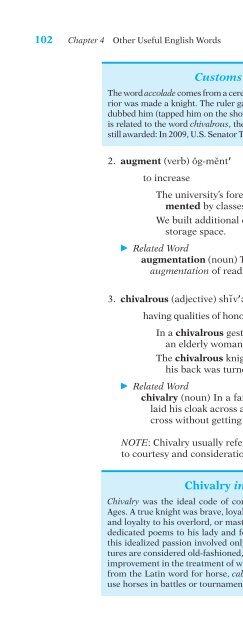- Page 4:
The World of Words
- Page 10:
Dedicated to the memories of my fat
- Page 14:
CONTENTSPrefacexiiiPART1 Dictionary
- Page 18:
ContentsixWord Roots Part 1 173Word
- Page 22:
ContentsxiChapter Exercises 385Pass
- Page 26:
PREFACECopyright © Cengage Learnin
- Page 30:
Prefacexv• Added features in voca
- Page 34:
PART1Dictionary Skillsand Context C
- Page 38:
Parts of Speech 3The rumor spread m
- Page 42:
Word Endings and Parts of Speech 5I
- Page 46:
CHAPTER1Words About PeopleAre you s
- Page 50:
Learning Strategy 9A host of fascin
- Page 54:
Learning Strategy 11Copyright © Ce
- Page 58:
Learning Strategy 13Copyright © Ce
- Page 62:
Words to Learn 15Words from Spanish
- Page 66:
Words to Learn 178. gullible (adjec
- Page 70:
Exercises 19ExercisesPart 1■ Who
- Page 74:
Exercises 213. disdainful, disdaini
- Page 78:
Words to Learn 2315. astute (adject
- Page 82:
Words to Learn 25Rosemary wasexuber
- Page 86:
Exercises 27ExercisesPart 2■ Who
- Page 90:
Exercises 29did not enjoyexpensive
- Page 94:
Chapter Exercises 31max ● i ● m
- Page 98:
Chapter Exercises 332. If I were ve
- Page 102:
Passage 35Copyright © Cengage Lear
- Page 106:
Insight into Idioms 37I NSIGHT INTO
- Page 110:
Did You Know? 39Did You Know?How Ma
- Page 114:
Learning Strategy 41In which senten
- Page 118:
Words to Learn 43An accord between
- Page 122:
Words to Learn 456. catastrophe (no
- Page 126:
Exercises 4712. renegade (noun, adj
- Page 130:
Exercises 49convict the wrong perso
- Page 134:
Words to Learn 51first sentence, ap
- Page 138:
Words to Learn 53Political Left and
- Page 142:
Exercises 55ExercisesPart 2■ Matc
- Page 146:
Exercises 57This poster of “Uncle
- Page 150:
Chapter Exercises 59CHAOS ERUPTS WH
- Page 154:
Chapter Exercises 613. The presiden
- Page 158:
Passage 63PassageSneakers: A Multib
- Page 162:
Passage 65can wear. But in a truly
- Page 166:
Insight into Idioms 67I NSIGHT INTO
- Page 170:
Did You Know? 69Did You Know?Copyri
- Page 174:
Words to Learn 71As you can see, th
- Page 178:
Words to Learn 735. contemplate (ve
- Page 182:
Exercises 7510. ludicrous (adjectiv
- Page 186: Exercises 778. Your essay can only
- Page 190: Words to Learn 79MANY TEENS TRY TO
- Page 194: Words to Learn 81The city inspector
- Page 198: Words to Learn 8321. flamboyant (ad
- Page 202: Exercises 85ExercisesPart 2■ Defi
- Page 206: Exercises 87herarticulation. After
- Page 210: Chapter Exercises 894. President Ca
- Page 214: Chapter Exercises 914-5. The spies
- Page 218: Passage 93Jackie Robinson “broke
- Page 222: Passage 952. He helped to racial pr
- Page 226: CHAPTER4Other Useful English WordsT
- Page 230: Learning Strategy 99an audiophile.
- Page 234: Words to Learn 1013. We don’t wan
- Page 240: 104 Chapter 4 Other Useful English
- Page 244: 106 Chapter 4 Other Useful English
- Page 248: 108 Chapter 4 Other Useful English
- Page 252: 110 Chapter 4 Other Useful English
- Page 256: 112 Chapter 4 Other Useful English
- Page 260: 114 Chapter 4 Other Useful English
- Page 264: 116 Chapter 4 Other Useful English
- Page 268: 118 Chapter 4 Other Useful English
- Page 272: 120 Chapter 4 Other Useful English
- Page 276: 122 Chapter 4 Other Useful English
- Page 280: 124 Chapter 4 Other Useful English
- Page 284: 126 Chapter 4 Other Useful English
- Page 288:
128 Chapter 4 Other Useful English
- Page 292:
130 Chapter 4 Other Useful English
- Page 296:
132 Part 2 Word ElementsRootsA root
- Page 300:
134 Part 2 Word ElementsThe answer
- Page 304:
136 Chapter 5 Word Elements: Prefix
- Page 308:
138 Chapter 5 Word Elements: Prefix
- Page 312:
140 Chapter 5 Word Elements: Prefix
- Page 316:
142 Chapter 5 Word Elements: Prefix
- Page 320:
144 Chapter 5 Word Elements: Prefix
- Page 324:
146 Chapter 5 Word Elements: Prefix
- Page 328:
148 Chapter 5 Word Elements: Prefix
- Page 332:
150 Chapter 5 Word Elements: Prefix
- Page 336:
152 Chapter 5 Word Elements: Prefix
- Page 340:
154 Chapter 5 Word Elements: Prefix
- Page 344:
156 Chapter 5 Word Elements: Prefix
- Page 348:
158 Chapter 5 Word Elements: Prefix
- Page 352:
160 Chapter 5 Word Elements: Prefix
- Page 356:
162 Chapter 5 Word Elements: Prefix
- Page 360:
164 Chapter 5 Word Elements: Prefix
- Page 364:
166 Chapter 5 Word Elements: Prefix
- Page 368:
168 Chapter 5 Word Elements: Prefix
- Page 372:
CHAPTER6Word Elements:People and Na
- Page 376:
172 Chapter 6 Word Elements: People
- Page 380:
174 Chapter 6 Word Elements: People
- Page 384:
176 Chapter 6 Word Elements: People
- Page 388:
178 Chapter 6 Word Elements: People
- Page 392:
180 Chapter 6 Word Elements: People
- Page 396:
182 Chapter 6 Word Elements: People
- Page 400:
184 Chapter 6 Word Elements: People
- Page 404:
186 Chapter 6 Word Elements: People
- Page 408:
188 Chapter 6 Word Elements: People
- Page 412:
190 Chapter 6 Word Elements: People
- Page 416:
192 Chapter 6 Word Elements: People
- Page 420:
194 Chapter 6 Word Elements: People
- Page 424:
196 Chapter 6 Word Elements: People
- Page 428:
198 Chapter 6 Word Elements: People
- Page 432:
200 Chapter 6 Word Elements: People
- Page 436:
202 Chapter 6 Word Elements: People
- Page 440:
CHAPTER7Word Elements: MovementMode
- Page 444:
206 Chapter 7 Word Elements: Moveme
- Page 448:
208 Chapter 7 Word Elements: Moveme
- Page 452:
210 Chapter 7 Word Elements: Moveme
- Page 456:
212 Chapter 7 Word Elements: Moveme
- Page 460:
214 Chapter 7 Word Elements: Moveme
- Page 464:
216 Chapter 7 Word Elements: Moveme
- Page 468:
218 Chapter 7 Word Elements: Moveme
- Page 472:
220 Chapter 7 Word Elements: Moveme
- Page 476:
222 Chapter 7 Word Elements: Moveme
- Page 480:
224 Chapter 7 Word Elements: Moveme
- Page 484:
226 Chapter 7 Word Elements: Moveme
- Page 488:
228 Chapter 7 Word Elements: Moveme
- Page 492:
230 Chapter 7 Word Elements: Moveme
- Page 496:
232 Chapter 7 Word Elements: Moveme
- Page 500:
234 Chapter 7 Word Elements: Moveme
- Page 504:
CHAPTER8Word Elements:Together and
- Page 508:
238 Chapter 8 Word Elements: Togeth
- Page 512:
240 Chapter 8 Word Elements: Togeth
- Page 516:
242 Chapter 8 Word Elements: Togeth
- Page 520:
244 Chapter 8 Word Elements: Togeth
- Page 524:
246 Chapter 8 Word Elements: Togeth
- Page 528:
248 Chapter 8 Word Elements: Togeth
- Page 532:
250 Chapter 8 Word Elements: Togeth
- Page 536:
252 Chapter 8 Word Elements: Togeth
- Page 540:
254 Chapter 8 Word Elements: Togeth
- Page 544:
256 Chapter 8 Word Elements: Togeth
- Page 548:
258 Chapter 8 Word Elements: Togeth
- Page 552:
260 Chapter 8 Word Elements: Togeth
- Page 556:
262 Chapter 8 Word Elements: Togeth
- Page 560:
264 Chapter 8 Word Elements: Togeth
- Page 564:
266 Chapter 8 Word Elements: Togeth
- Page 568:
268 Chapter 8 Word Elements: Togeth
- Page 572:
270 Chapter 8 Word Elements: Togeth
- Page 576:
272 Chapter 9 Word Elements: Number
- Page 580:
274 Chapter 9 Word Elements: Number
- Page 584:
276 Chapter 9 Word Elements: Number
- Page 588:
278 Chapter 9 Word Elements: Number
- Page 592:
280 Chapter 9 Word Elements: Number
- Page 596:
282 Chapter 9 Word Elements: Number
- Page 600:
284 Chapter 9 Word Elements: Number
- Page 604:
286 Chapter 9 Word Elements: Number
- Page 608:
288 Chapter 9 Word Elements:Numbers
- Page 612:
290 Chapter 9 Word Elements:Numbers
- Page 616:
292 Chapter 9 Word Elements: Number
- Page 620:
294 Chapter 9 Word Elements: Number
- Page 624:
296 Chapter 9 Word Elements: Number
- Page 628:
298 Chapter 9 Word Elements: Number
- Page 632:
300 Chapter 9 Word Elements: Number
- Page 636:
302 Chapter 9 Word Elements: Number
- Page 640:
CHAPTER10Word Elements:Thought and
- Page 644:
306 Chapter 10 Word Elements: Thoug
- Page 648:
308 Chapter 10 Word Elements: Thoug
- Page 652:
310 Chapter 10 Word Elements: Thoug
- Page 656:
312 Chapter 10 Word Elements: Thoug
- Page 660:
314 Chapter 10 Word Elements: Thoug
- Page 664:
316 Chapter 10 Word Elements: Thoug
- Page 668:
318 Chapter 10 Word Elements: Thoug
- Page 672:
320 Chapter 10 Word Elements: Thoug
- Page 676:
322 Chapter 10 Word Elements: Thoug
- Page 680:
324 Chapter 10 Word Elements: Thoug
- Page 684:
326 Chapter 10 Word Elements: Thoug
- Page 688:
328 Chapter 10 Word Elements: Thoug
- Page 692:
330 Chapter 10 Word Elements: Thoug
- Page 696:
332 Chapter 10 Word Elements: Thoug
- Page 700:
334 Chapter 11 Word Elements: The B
- Page 704:
336 Chapter 11 Word Elements: The B
- Page 708:
338 Chapter 11 Word Elements: The B
- Page 712:
340 Chapter 11 Word Elements: The B
- Page 716:
342 Chapter 11 Word Elements: The B
- Page 720:
344 Chapter 11 Word Elements: The B
- Page 724:
346 Chapter 11 Word Elements: The B
- Page 728:
348 Chapter 11 Word Elements: The B
- Page 732:
350 Chapter 11 Word Elements: The B
- Page 736:
352 Chapter 11 Word Elements: The B
- Page 740:
354 Chapter 11 Word Elements: The B
- Page 744:
356 Chapter 11 Word Elements: The B
- Page 748:
358 Chapter 11 Word Elements: The B
- Page 752:
360 Chapter 11 Word Elements: The B
- Page 756:
362 Chapter 11 Word Elements: The B
- Page 760:
CHAPTER12Word Elements:Speech and W
- Page 764:
366 Chapter 12 Word Elements: Speec
- Page 768:
368 Chapter 12 Word Elements: Speec
- Page 772:
370 Chapter 12 Word Elements: Speec
- Page 776:
372 Chapter 12 Word Elements: Speec
- Page 780:
374 Chapter 12 Word Elements: Speec
- Page 784:
376 Chapter 12 Word Elements: Speec
- Page 788:
378 Chapter 12 Word Elements: Speec
- Page 792:
380 Chapter 12 Word Elements: Speec
- Page 796:
382 Chapter 12 Word Elements: Speec
- Page 800:
384 Chapter 12 Word Elements: Speec
- Page 804:
386 Chapter 12 Word Elements: Speec
- Page 808:
388 Chapter 12 Word Elements: Speec
- Page 812:
390 Chapter 12 Word Elements: Speec
- Page 816:
392 Chapter 12 Word Elements: Speec
- Page 820:
394 Chapter 12 Word Elements: Speec
- Page 824:
396 Chapter 12 Word Elements: Speec
- Page 828:
398 Chapter 12 Word Elements: Speec
- Page 832:
400 Answers to QuizzesCHAPTER 9page
- Page 836:
This page intentionally left blank
- Page 840:
404 Indexbureaucrat, 44bureaucratic
- Page 844:
406 Indexhenpecked, 305high time, 1
- Page 848:
408 Indexvital, 179vitality, 180viv



